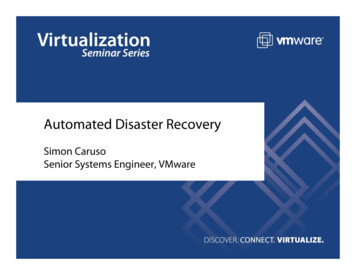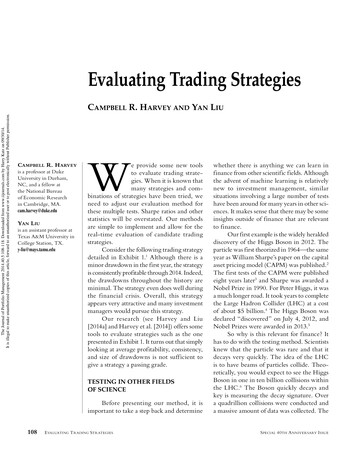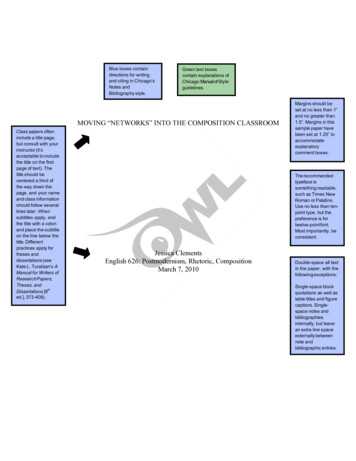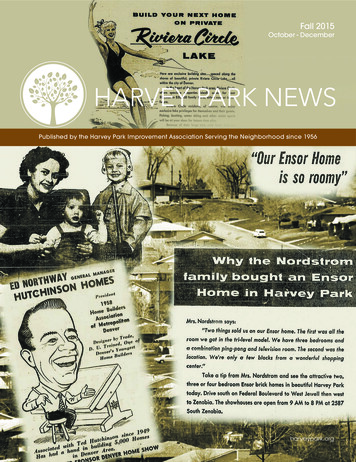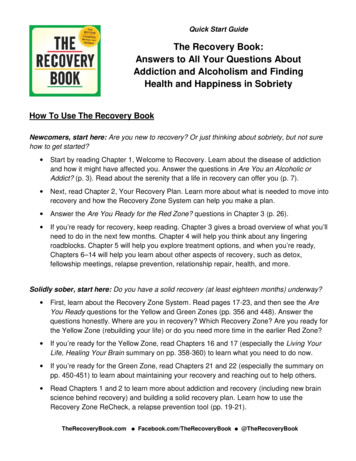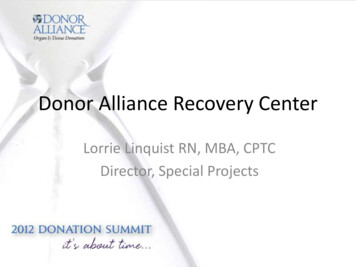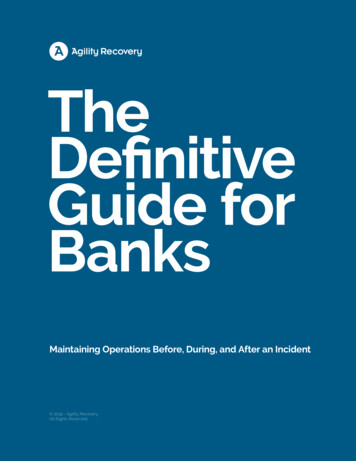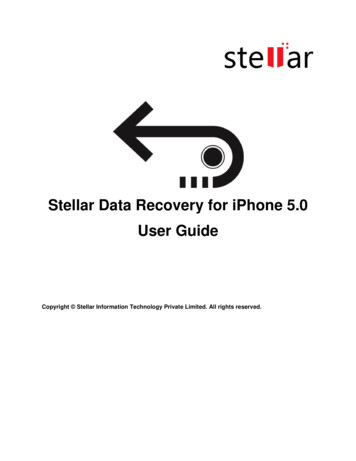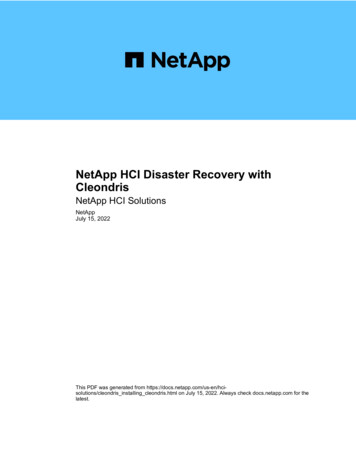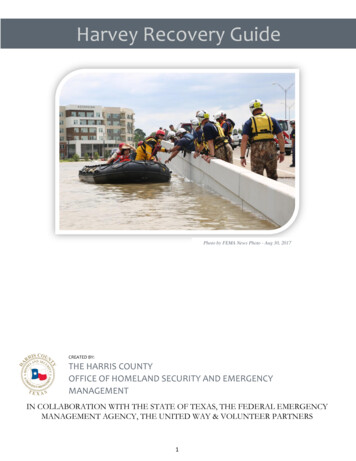
Transcription
Harvey Recovery GuidePhoto by FEMA News Photo - Aug 30, 2017CREATED BY:THE HARRIS COUNTYOFFICE OF HOMELAND SECURITY AND EMERGENCYMANAGEMENTIN COLLABORATION WITH THE STATE OF TEXAS, THE FEDERAL EMERGENCYMANAGEMENT AGENCY, THE UNITED WAY & VOLUNTEER PARTNERS1
INTRODUCTIONHarris County residents experienced one of the worst flooding disasters in U.S. history whenHurricane Harvey impacted the region late August 2017. Dozens of lives were lost and thousands ofhomes were destroyed as catastrophic rainfall devastated Harris and surrounding counties.As communities continue to reclaim normalcy from Harvey, the Harris County Office of HomelandSecurity & Emergency Management is working in collaboration with the State of Texas, the FederalEmergency Management Agency (FEMA) & non-profit partners to help with the recovery process.This Harvey Recovery Resource Guide offers important information about available resources andassistance available to residents affected by the floods.All individuals impacted by flooding should apply for FEMA assistance at 1-800-621-3362 or onlineat www.DisasterAssistance.gov by October 26, 2017.2
TABLE OF CONTENTSQuick Guide . 4Local Assistance . 5FEMA Disaster Assistance . 11How to Apply for FEMA Disaster Assistance .12FAQs About FEMA Assistance .14FAQs About FEMA Assistance & Citizenship Eligibility .17Basic Tips for Filing Claims .18Assistance to Individual Households . 20FEMA/State Disaster Recovery Centers . 24Small Business Administration Disaster Loans . 25USDA Assistance for Individuals & Small Businesses . 29Tax Relief & IRS Assistance . 32State Agency Assistance . 33Oil & Gas Concerns . 35Health & Safety . 36Connecting with Human & Health Service Organizations . 37Beware of Fraud & Scams. 38Supporting Others . 39Rebuilding. 403
QUICK GUIDEFor an immediate life threatening emergency, call 911For non-emergency assistance, call 2-1-1 (county and state wide) or 3-1-1 (in Houston)Coast Guard: Due to the high call volume they are receiving, the Coast Guard has opened multipletelephone lines. Please stay on the line until you reach an operator: 281-464-4851, 281- 464-4852,281-464-4853, 281-464-4854, 281-464-4855FEMA: 1-800-621-3362 or 1-800-462-7585 for the speech/hearing-impaired. Apply for disaster aidonline at www.fema.gov or www.disasterassistance.govSmall Business Administration (SBA) Disaster Assistance Center:1-800-659-2955; online at is County Office of Homeland Security & Emergency Management:Flood Warning System: https://www.harriscountyfws.org/ Office: 1-713-881-3100Map of shelters and quick facts: nd- recoveryservices/find-an-open-shelterAmerican Red Cross:Disaster and Emergency Assistance: http://www.redcross.org/find-help Houston Office: (713) 5268300National Number: (866) 438-4636Texas Emergency Assistance:1-877-541-7905 or online at ndex.htmTxDOT: For road closure information, please visit: drivetexas.orgConnect with Evacuees: www.SafeAndWell.orgDonation info: https://ghcf.org/hurricane-relief/For assistance please contact any of my offices, or visit my website at www.culberson.house.gov4
LOCAL ASSISTANCEReady Harrishttp://readyharris.org/Harris County Recovery Networkhttp://harrisrecovery.org/City of Houston Disaster Recovery Informationhttps://houstonrecovers.org/Texas Gulf Coast Regional VOADhttp://txgulfcoastvoad.org/2-1-1 Texas - 2-1-1 Texas 2-1-1 Texas, operated locally by the United Way of Greater Houston,connects Texans with information on social services and disaster-related information.Visit 211texas.org to connect with services or call 2-1-1 (877-541-7905) to speak with an operatorabout your individual needs.Debris and Building Permit Hotline for Unincorporated Harris County – 713-274-3880For Hazardous Waste Disposal Call 281-560-6200Insurance Complaints:Who to call with an insurance complaintTexas Department of Insurance 800-252-3439Texas Watch 888-738-4226Texas Attorney General 800-252-8011Disaster Clean-UpIf you need assistance with cleanup after the storm, call 1-800-451-1954 or 844-965-1386 to beplaced on the list. Disaster recovery organizations will contact you if they are able to help you withclean-up efforts in your area.Food assistance: For a list of food pantries and other food assistance, call 2-1-1 or contact the Houston FoodBank or call 832-369-9390. For disaster food stamp benefits, call the Disaster Supplemental Nutrition AssistanceProgram (DSNAP) at 1-877-541-7905.5
Transitional Sheltering Assistance (TSA) was approved in Texas for eligible disaster survivorswho have a continuing need for shelter because they are unable to return to their homes for anextended period of time. This initiative is intended to provide short-term lodging for eligible disastersurvivors whose communities are either uninhabitable or inaccessible due to disaster-related damage.FEMA will contact you if you are eligible for the program. A listing of available properties under thisprogram can be found at www.femaevachotels.com.Disaster Unemployment Assistance is available for Texas residents whose jobs were affected byTropical Storm Harvey in Texas, specifically those who live or work in the counties included in themajor disaster declaration. This may include people not normally eligible for unemployment benefits,such as self-employed persons and farm-workers. They can apply for unemployment benefits onlineat .Immediate Foreclosure Relief from the U.S. Department of Housing and UrbanDevelopment (HUD) may be available for Texas residents. HUD is granting a 90-day moratoriumon foreclosures and forbearance on foreclosures of Federal Housing Administration (FHA)-insuredhome mortgages. There are approximately 200,000 FHA-insured homeowners living in theseimpacted counties that may be eligible. HUD is also offering longer-term recovery assistance tosurvivors and impacted communities. For more information, visit HUD’s website.Small Business Administration (SBA) Loans – remind registrants to return SBA LoanApplication, if they received one. It is part of the registration process.Property assistance: The National Flood Insurance Program answers questions for policyholders about the claimsprocess at 800-621-3362 Search for your insurance company contact information here to make property loss claims. To find a towed car, click here or call 832-394-4869 For clean-up assistance, contact CrisisCleanup.org, or call 1-800-451-1954 to report yourneed. In unincorporated Harris County, call the Residential Debris and Damage AssessmentHotline: 713-274-3880. USA.gov provides advice on replacing vital documents. The Texas Department of Insurance has advice on what to do if your home or auto wasdamaged by Harvey, the insurance claims process and contractor fraud prevention and haveextended their call center hours to 8 p.m. — 1-800-252-3439 or click here.6
Additional Resources American Red Cross - 1-877-500-8645, 866-526-8300 (Local Houston Office) Salvation Army - 713-752-0677 2-1-1 TEXAS/UNITED WAY HELPLINE - Dial 2-1-1. Rebuildinghouston.org helps senior, disabled and veteran homeowners in Harris County withhome rebuilding efforts. Call 713.659.2511 for more information. Airbnb is helping find temporary housing for those displaced by the floods. 1-415-800-5959call 1-855-424-7262 (toll-free) Those eligible for FEMA's Transitional Shelter Assistance program may be able to stay at aparticipating hotel free of charge temporarily if they are unable to return home. For a list ofparticipating hotels, click here. Contact FEMA to apply and with questions: 1-800-462-7585. Harris County Housing and Community Resource Center helps with locating emergencyshelter, rental property and financial assistance. Call them at 713-696-1998.FinancesYou will want to determine whether your financial situation has been affected by the storm. Identifyyour available financial resources, then list your expenses. Prioritize your expenses so that thenecessities are paid for first; then you can evaluate how to spend the funds that remain.If you are concerned about your ability to pay your bills, the Consumer Credit Counseling Service(CCCS)can help you prepare a reasonable budget. CCCS can also help you negotiate a manageablerepayment plan for your outstanding debts. There is no fee for services, but you must have someincome in your household.Make a list of all those with whom you do business and inform them of your circumstances if youare concerned about your ability to pay your bills. You may be able to postpone or reduce payments.Keep records of all such conversations and keep copies of everything for your files.To avoid some consumer pitfalls following the disaster, you may contact the Better Business Bureau(BBB), the Texas Attorney General’s Consumer Protection Hotline or the Texas Department ofInsurancefor information about how to protect yourself against consumer fraud.Financial Services and Consumer Advice Better Business Bureau - 713-341-6141 or 713-868-9500 Consumer Credit Counseling Service - 713-923-2227 Texas Attorney General - 1-800-621-05087
Texas Department of Insurance - 1-800-252-3439Legal Services Lone Star Legal Aid - 713-652-0077 Houston Volunteer Lawyers are offering free legal assistance to those affected by Harvey. The State Bar of Texas Disaster Hotline: 800-504-7030. The hotline — answered in English,Spanish, and Vietnamese — connects low-income people affected by a disaster with legal aidproviders in their area who can help with such issues as replacing lost documents, answeringinsurance questions, helping with landlord-tenant problems, and handling consumerprotection concerns such as price-gouging and contractor scams during the rebuildingprocess. Callers can leave a message at any time. The Houston Bar Association will host a live phone bank manned by licensed Texas lawyers- Monday through Friday, September 5 to 29, from 3 pm to 5 pm. Extended hours (5 pm to 9pm) will be offered on Wednesday, September 6, and Wednesday, September 20. Simply call713-759-1133 during the hours of operation. The same service will be provided for SpanishSpeakers on Thursday, September 7, between the hours of 5 pm and 9 pm. TexasLawHelp.org provides this list of legal advice articles for disaster recovery The Hurricane Harvey legal assistance clinic scheduled for Friday at the Michael E. DeBakeyVA Outpatient Clinic is at capacity as of 10:55 a.m. The Houston Bar Association, HoustonVolunteer Lawyers and Lone Star Legal Aid are setting up additional clinics throughout thearea that will be open to the public. The next legal assistance clinic is scheduled for Sept. 6from 4 to 7 p.m. at the Montrose Center (401 Branard)CounselingDisaster Related Crisis Counseling (24 hours) - 713-970-7070The primary goal of these programs is to alleviate the suffering experienced by survivors and victimsof disasters. Services include, but are not limited to: Coordination of disaster mental health services Development of crisis counseling and brief therapy programsCatholic Charities - 713-526-4611Family Houston - 713-861-4849Houston Galveston Institute - 713-526-8390Innovative Alternatives - Bay Area - 832-864-6000Jewish Family Service - 713-667-93368
Montrose Counseling Center - 713-529-0037HealthIt is very important that you take care of yourself and other family members who have been throughthis crisis. Be sure to take your regular medications (insulin, blood pressure, antidepressant, etc.) anddon’t hesitate to seek medical help if you feel sick following the confusion and anxiety as a result ofthis disaster.A variety of health care resources are available for you as you need them and you are encouraged totake advantage of them promptly. Your normal resistance to illness may have been lowered as aresult of the stress you have been experiencing. You want to make every effort to build yourself upagain. Take your vitamins, eat properly, get enough sleep and seek medical help quickly if you oryour children begin to feel ill.Food assistance: For a list of food pantries and other food assistance, call 2-1-1 or contact the Houston FoodBank or call 832-369-9390. For disaster food stamp benefits, call the Disaster Supplemental Nutrition AssistanceProgram(DSNAP) at 1-877-541-7905. SNAP recipients affected by Harvey will see their benefits credited to their Lone Star CardSept. 1 instead of it being staggered throughout the first half of the month. Recipients canvisit YourTexasBenefits.com or use the Your Texas Benefits mobile app to view benefitinformation and make any address changes if needed.Houston-Area Health Care Resources Access Health - 281-342-4530 Harris Health System - 713-566-6400 City of Houston Health & Human Services Dept - 832-393-5169 San Jose Clinic - 713-228-9411 Legacy Community Health - 832-548-5000Property assistance: The National Flood Insurance Program answers questions for policyholders about the claimsprocess at 800-621-3362 Search for your insurance company contact information here to make property loss claims. To find a towed car, click here or call 832-394-48699
For clean-up assistance, contact CrisisCleanup.org, or call 800-451-1954 to report your need.In unincorporated Harris County, call the Residential Debris and Damage AssessmentHotline: 713-274-3880. USA.gov provides advice on replacing vital documents. The Texas Department of Insurance has advice on what to do if your home or auto wasdamaged by Harvey, the insurance claims process and contractor fraud prevention and haveextended their call center hours to 8 p.m. — 800-252-3439 or click here.10
FEMA DISASTER ASSISTANCEAll individuals who were impacted by the flood should apply for FEMAassistance. Please call 1-800-621-3362 or visit www.DisasterAssistance.gov byOctober 26, 2017.On August 25, 2017, President Trump issued a major disaster declaration for the State of Texas,ordering federal aid to supplement state and local recovery efforts in areas affected by severe storms,flooding, landslides, and mudslides. The flood has displaced many families and communities.The Federal Emergency Management Agency (FEMA) is the primary federal agency tasked withhelping individuals, businesses, and public entities recover after a disaster. All individuals impactedby the flood should register through FEMA at www.disasterassistance.gov.Under Title V of the Stafford Act, the Department of Homeland Security, through FEMA, isauthorized to provide emergency assistance to save lives and to protect property and public healthand safety, or to lessen or avert the threat of a catastrophe in the designated areas.FEMA individual assistance allows homeowners to qualify for grants to help cover uninsured costsof restoring flood-damaged homes. Individuals in the following 29 counties may be eligible forFEMA Individual Assistance: Aransas, Bee, Brazoria, Calhoun, Chambers, Colorado,Fayette, Fort Bend, Galveston, Goliad, Hardin, Harris, Jackson, Jasper, Jefferson, Kleberg,Liberty, Matagorda, Montgomery, Newton, Nueces, Orange, Refugio, Sabine, San Jacinto,San Patricio, Victoria, Waller, and WhartonFEMA public assistance qualifies a county for emergency work, repair or replacement of disasterdamaged facilities, debris removal, and emergency protective measures. The following 29 countieswere designated for FEMA Public Assistance: Aransas, Bee, Brazoria, Calhoun, Chambers,Colorado, Fayette, Fort Bend, Galveston, Goliad, Hardin, Harris, Jackson, Jasper, Jefferson,Kleberg, Liberty, Matagorda, Montgomery, Newton, Nueces, Orange, Refugio, Sabine, SanJacinto, San Patricio, Victoria, Waller, and Wharton.11
HOW TO APPLY FOR FEMA DISASTER ASSISTANCEAll individuals who were impacted by the flood should apply for FEMAassistance. Please call 1-800-621-3362 or visit http://www.DisasterAssistance.gov byOctober 26, 2017.Individuals in Aransas, Bee, Brazoria, Calhoun, Chambers, Colorado, Fayette, Fort Bend, Galveston,Goliad, Hardin, Harris, Jackson, Jasper, Jefferson, Kleberg, Liberty, Matagorda, Montgomery,Newton, Nueces, Orange, Refugio, Sabine, San Jacinto, San Patricio, Victoria, Waller, and Whartoncounties may be eligible for individual assistance: Apply by phone to FEMA: 1-800-621-3362 (TTY 1-800-462-7585 for the speech-or hearingimpaired). Those who use 711 or Video Relay Service (VRS) can call 1-800-621-3362. You can also apply online anytime at www.DisasterAssistance.gov. By smartphone or tablet, use m.fema.gov.Please have the following information available when you call: A phone number and a reliable alternate in case FEMA needs to call you back; Address of the damaged property; Social Security number; Bank account information (or direct deposit information); Insurance information (if you have insurance); Brief description of damages; Current mailing address; and Pen and paper to write down your registration number.Government disaster assistance only covers basic needs and usually will not compensate you foryour entire loss. If you have insurance, the government may help pay for basic needs not coveredunder your insurance policy.12
Disaster-related assistance may include: Rental payments for temporary housing for those whose homes are unlivable; Grants for home repairs and replacement of essential household items; Unemployment payments for workers who temporarily lost jobs because of the disaster anddo not qualify for state benefits (self-employed); Low-interest loans to cover residential losses not fully compensated by insurance; Crisis counseling for those traumatized by the disaster; or Advisory assistance for legal veterans’ benefits and social security matters.13
FAQs ABOUT FEMA ASSISTANCEAll individuals who were impacted by the flood should apply for FEMAassistance. Please call 1-800-621-3362 or visit www.DisasterAssistance.gov byOctober 26, 2017.Do I have to register with FEMA to get help? Yes, with very few exceptions, if you want federalassistance you must register with FEMA, either by telephone (1-800-621-3362) or online(www.DisasterAssistance.gov). You will need your FEMA registration number for future reference.What is the difference between FEMA and the SBA? FEMA coordinates the FederalGovernment’s role in preparing for, preventing, mitigating the effects of, responding to, andrecovering from all domestic disasters. SBA, on the other hand, is the Federal Government’s primarysource of money for the long-term rebuilding of disaster-damaged private property. SBA helpshomeowners, renters, businesses, and non-profit organizations repair or replace real estate, personalproperty, machinery and equipment, inventory, and business assets that have been damaged ordestroyed in a declared disaster. These disaster loans cover uninsured and uncompensated losses anddo not duplicate benefits of other agencies or organizations. For information about SBA programs,applicants may call 1-800-659-2955 (TTY 1-800-877-8339).What happens after I register? You will receive a call from a FEMA housing inspector. On-siteinspections are an important early step helping to speed aid to homeowners and renters sufferingflood damage. All inspectors carry photo identification and will have the FEMA registration numberassigned to the person whose home is being inspected. Only an official FEMA inspector will havethe number that was provided during registration. The FEMA inspection is free so beware ofindividuals attempting to charge for inspections or remodeling contractors claiming to be FEMAapproved. FEMA does not endorse construction firms.When a FEMA inspector calls for an appointment, registrants should provide a clear, accuratedescription of the damaged property and current contact information. You do not have to wait forthe inspector to arrive before beginning repairs. Photos, contractor estimates, and receipts can beprovided to FEMA inspectors to document the extent of the damage. The inspection generally takes30 - 40 minutes. The inspector enters damage-related information into a handheld computer andsends data electronically to FEMA. The inspector does not determine whether a registrant is eligiblefor assistance or the amount of assistance an individual may receive.14
You may also receive a call from a representative of the SBA. An SBA loan application is included inthe FEMA registration materials and is a key part of the registration process, but you are notrequired to take out an SBA loan. However, if you think you may need a loan, it is important toapply because it may open other opportunities for federal assistance. No appointment is necessary tomeet with an SBA Customer Service Representative at a Disaster Recovery Center or BusinessRecovery Center. There is no cost to apply for an SBA disaster loan and you are not obligated toaccept a loan that SBA approves.FEMA may also direct you to other federal organizations, such as the Department of Housing andUrban Development, on a case-by-case basis.Where can I find updated information from FEMA? Up-to-date information on floods andflood assistance in Texas is accessible at http://www.fema.gov/disaster/4332. For a three-StepDisaster Assistance Process and recent news on disaster response and recovery, please visithttp://www.fema.gov/apply-assistance. If you are looking for the nearest Disaster Recovery Center,go to http://www.fema.gov/disaster-recovery-centers.What if I have damage on my privately owned road? Homeowners using privately owned accessroads and bridges that were damaged as a result of the severe storms, flooding, landslides andmudslides may receive limited disaster assistance help from FEMA and the U.S. Small BusinessAdministration (SBA).FEMA’s Individual Assistance (IA) program is available to help homeowners, renters and businessowners in eighteen designated Texas Counties including Aransas, Bee, Brazoria, Calhoun, Chambers,Fort Bend, Galveston, Goliad, Harris, Jackson, Kleberg, Liberty, Matagorda, Nueces, Refugio, SanPatricio, Victoria, and Wharton. Homeowners may be eligible for a grant to repair road entrances or rights of way from theirhomes, including privately owned roads and bridges that provide solitary access to a home. Homeowners who jointly own access roads and bridges may also be eligible for repair grantsunder certain circumstances.To discuss your circumstance, please visit any of the disaster recovery centers or call FEMA at 1800-621-3362 (Voice or 7-1-1/Relay) or TTY 1-800-462-7585.15
The SBA offers low-interest disaster loans for homeowners, renters, businesses of all sizes andprivate nonprofit organizations. In some cases, SBA may be able to offer low-interest rate disasterloans to help homeowners, homeowner associations, co-ops or road-owner associations that owndamaged privately owned roads or bridges that provide solitary access to a home. SBA disaster loansmust only be used to pay for disaster-related repairs. They cannot be used to pay for pre- existingdamage or any upgrades to the property, unless such upgrades are code required. Please visit adisaster recovery center or an SBA Business Recovery Center to discuss your case. For more SBA information go to www.sba.gov/disaster or call 1-800-659-2955 (TTY 1-800977-8339).**If individuals have concerns about their disaster-damaged privately owned access road, theyshould contact their local emergency manager.16
FAQs ABOUT FEMA ASSISTANCE & CITIZENSHIP ELIGIBILITY1. What are FEMA’s citizenship/immigration requirements? You must be a U.S. Citizen, Non-Citizen Natural, or a Qualified Alien in order to beeligible for FEMA cash assistance programs, including Individuals and HouseholdsProgram Assistance and Disaster Unemployment Assistance. If you are NOT a Citizen, Non-Citizen Natural or Qualified Alien andneed assistance, please contact the Red t/volunteer For more information, visit ster-response A qualified Alien includes anyone with legal permanent residence (“green card”). You must sign a declaration and release that you are a U.S. Citizen, Non-CitizenNatural or Qualified Alien. If you are none of the above, but have a minor child who is a U.S. Citizen, you canapply for assistance on your child’s behalf. You must provide his or her social securitynumber. You do not have to be a U.S. Citizen or Qualified Alien for crisis counseling orDisaster Legal Services or for other short-term, non-cash emergency assistance.2. Are foreign students studying in the U.S. eligible for FEMA cash assistance asQualified Aliens? Foreign students may qualify for non-cash, in-kind disaster relief (such as search andrescue, provision of food, water, shelter or emergency medical assistance) but do notqualify for cash assistance.17
BASIC TIPS FOR FILING CLAIMSAll individuals who were impacted by the flood should apply for FEMA assistance. Pleasecall 1-800-621-3362 or visit www.DisasterAssistance.gov by October 26, 2017. Contact your insurance agent or company as soon as possible and have your policy numbersavailable when you call. Ask what documents, forms, and data you’ll need to file a claim. Advisethem if you no longer have documents and alternative documents may be provided. Keep track of all the expenses associated with the loss and keep copies of all of your paperwork. Take photographs or video of the damage. If your property is partially damaged, try to protect it against further losses by making temporaryrepairs. Make repairs necessary to prevent further damage to your property. Don’t makepermanent repairs until your insurance company has inspected the property and you havereached an agreement on the cost of repairs. Keep receipts associated with such repairs, as thesemay be reimbursable under your insurance. If your home is damaged to the extent that it is unlivable, ask your insurance company if youhave coverage for additional living expenses. Call the company to advise them of your temporarylocation and contact information. If you are filing claims for damaged appliances, furniture, and other items, don’t throw awaydamaged property unless instructed to do so by your insurance adjuster. Don’t start permanentrepairs without prior approval from your insurer. Be sure to ask contractors for references and check them before you sign a contract for repairs,removal or replacement. Check with the Better Business Bureau, or the Consumer ProtectionDivision of the Texas Attorney General’s office r-scams to make sure the company has a goodtrack record or to report suspected price gouging. Obtain more than one estimate, and get everything in writing. Don’t be pressured into signingthe first contract that is presented to you. Beware of contractors who demand upfront paymentbefore work begins or who request payment in full before work is completed. If the contractorneeds payment to buy supplies, go with the contractor and pay the supplier directly. You have the right to choose your contractor. Your insurer may provide you with a list of preapproved contractors, but the policyholder has the final say in contractor selection.18
People who suffered property loss may find themselves being contacted by someone whoidentifies themselves as a public adjuster. Texans who choose to work with public adjustersshould make sure to ask to see the public adjuster’s license before working with them. Publicadjusters work for the policyholder and charge a fee to the policyholder. Company adjusters donot charge fees. Contact your creditors if you can’t cover all of your expenses. Try to negotiate a payment planand document all conversations with insurance companies, creditors, or relief agencies. If you are not able to negotiate an acceptable settlement with your insurer, call the InsuranceDepartment for assistance and advice.19
ASSISTANCE TO INDIVIDUAL HOUSEHOLDSFEMA also may determine that you qualify for the Individuals and Households Program (IHP).IHP provides financial help or direct services to those who have necessary expenses and seriousneeds if they are unable to meet the needs through other means such as insurance or loans. Up to 33,000 is available in financial help (adjusted each year on October 1st), while some forms of IHPassistance have limits. Flood insurance may be required as indicated below. Forms of help availableinclude: Housing Assistance (including Temporary Housing, Repair, Replacement, and SemiPermanent or Permanent Housing Construction) and Other Needs Assistance (including personalproperty and other items).Please Note: Though the maximum available grant is 33,000, it would only be available ifinsurance and loan options were first exhausted. Please note that few applicants qualify for the fullamount.The following ty
MANAGEMENT AGENCY, THE UNITED WAY & VOLUNTEER PARTNERS Harvey Recovery Guide Photo by FEMA News Photo - Aug 30, 2017 CREATED BY: . If you are concerned about your ability to pay your bills, the Consumer Credit Counseling Service (CCCS)can help you prepare a reasonable budget. CCCS can also help you negotiate a manageable

